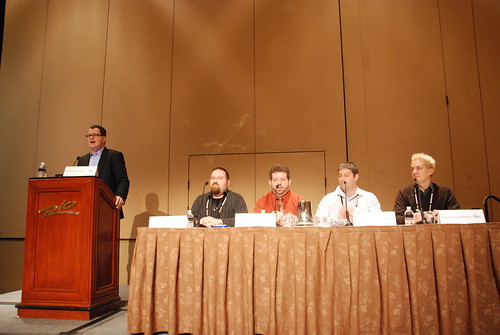Two weeks ago I was in Las Vegas to party, see shows and, oh yeah, Rock It at Affiliate Summit West 2010. I was part of a panel called Monetizing Blogs for Affiliate Marketing and SEO. The panel was moderated by Kris Jones of Pepperjam (@PepperjamCEO). On the panel were myself, Murray Newlands (@MurrayNewlands), Tim Jones (@TheRealTimJones) and John Carcutt (@JohnCarcutt). Prior to the show we had a phone call and quite a few e-mails to discuss what we were going to talk about, the format of the panel and what we wanted to accomplish during the session.
Success Begins with Planning
I mentioned that prior to the event we had a phone call and many e-mails to discuss what our session was going to be about. We detailed the overall format which was for each of us to give a little intro and then Kris would ask questions directly to the panel members. We would then allow for much of the time for questions from the audience. We were all on the same page and I don’t think that anyone on the panel hogged spotlight more than anyone else.
Success Continues with Connecting with the Audience
You might think I mean connecting with the audience in the session which is important but I am talking about connecting with your audience prior to the session. If you can get a list of attendees and somehow make contact with them prior to the event then fantastic. I did this because Affiliate Summit offers attendees the option to create an online schedule of sessions that they want to attend. I was able to see who everyone was and I attempted to contact many of the people listed either through the Affiliate Summit Social Network or directly on blogs or Twitter or Facebook. All of these outposts served as points where contact could be made.
What Can You Do to Connect with Your Audience?
I emailed each person with a quick intro of who I was and that I was one of the panelists. I then asked them why they choose to attend that session over the others. I also asked what they expected to gain from the session and if they had any questions that they would like us to address. Just a simple contact to say I’m interested and happy that you want to attend my session, I want to do a good job and provide you with value so how can I do that for you?
What if You Cannot Contact People BEFORE Your Session?
It goes without saying that you should be on time for your session but I suggest that you get to the session early. If people are in line to see the session then start up conversations with attendees. Introduce yourself and ask them what they are expecting to get from the session and if they have any questions. All the better if you can remember people’s names and address them by name when you answer the question in the session itself. Making that connection personal shows that once again you care.
Future Success Hinges on Follow-Up
If you are able to get a listing of everyone who attended your session then shoot them an e-mail and thank them for attending the session. Ask if all of their questions were answered. As them what they liked about the session, what they didn’t like and how they would have improved the session. If you see comments that appeared on Twitter or if anyone did a blog post about the session then take the time to leave a comment on the blogs or on Twitter. If someone took the time to leave some sort of feedback then you touched your audience and owe it to them to respect what they have to say about that session by interacting in some way.
Always Lead With Thank You
Even if you get blasted by someone who saw your panel you should always respond with Thank you. If you find someone trashing the panel on their blog then leaving a comment of “Thank you for the feedback, I can see how we have differing opinions on the subject, can we come to some common ground and hash this out?” will go a long way. Maybe you weren’t clear on something, maybe you didn’t answer a question that someone had or you didn’t answer it to the satisfaction of the audience. You can repair that rift and achieve common ground with a simple thank you and willingness to understand.
What are YOUR Tips for Speaking on a Successful Panel?
